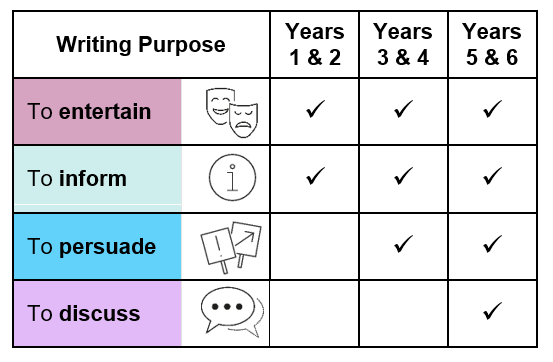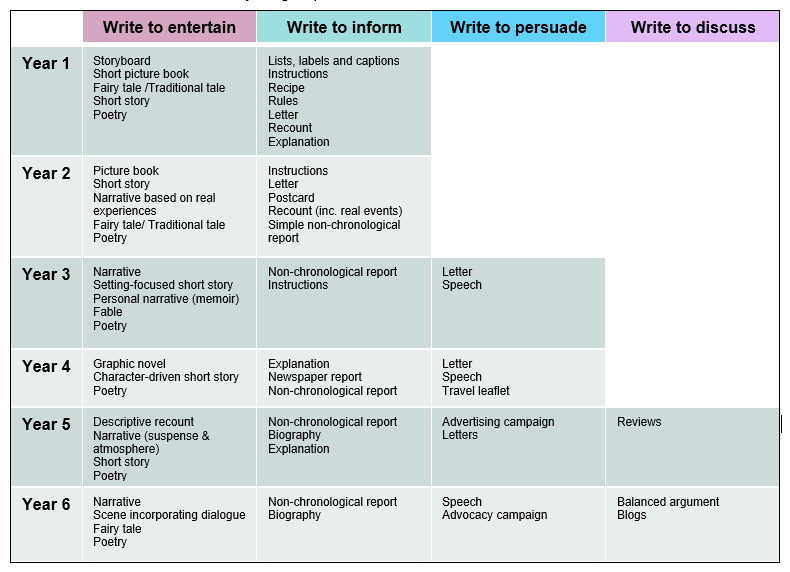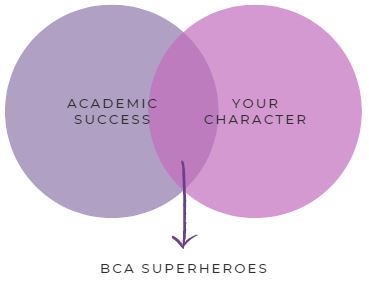Writing
Intent
At Bishop Creighton Academy, we believe that every child is a writer. We are passionate about developing every child’s knowledge, motivation and confidence in their writing. We have chosen HFL Education’s ESSENTIALWRITING as the basis of our writing curriculum for years 1-6. This is an ambitious and progressive writing scheme which provides our children with opportunities and tools to write for a range of specific purposes and authentic audiences. As a result, our children feel inspired and ready to write high-quality outcomes within the classroom but also have the knowledge, strategies and confidence to choose to write in their own lives.
Implementation
Each year group has 13-16 teaching units, all of which use diverse and high-quality literature as good examples of writing craft and to help to motivate or inspire children to write.
 |
ESSENTIALWRITING is fully aligned with the National Curriculum for English including writing composition, vocabulary, grammar & punctuation for each year group. Each writing unit is progressively structured and centred around the different writing purposes: to entertain; to inform; to persuade and to discuss. The writing purposes are also progressively sequenced across the academy. |

Follow this link to access the statutory content of the English objectives within the National Curriculum: English programmes of study: key stages 1 and 2 (publishing.service.gov.uk). The information below outlines our approach to the teaching of writing in each year group, which encompasses the teaching of the statutory content as outlined within the National Curriculum for writing for key stage one (Year 1 – Year 2), lower key stage two (Year 3 – 4) and upper key stage two (Year 5 – Year 6). For this academic year, ESSENTIALWRITING is implemented in Y1 – Y6 but builds on the foundational learning from the EYFS.
Alongside ESSENTIALWRITING, at Bishop Creighton Academy, we have adopted Spelling Shed spelling programme as the basis of our spelling curriculum. ESSENTIALWRITING supports our children to apply this learning in context and build their spelling confidence. Writing models reflect age-appropriate spelling objectives and children are taught how to monitor the accuracy of their writing. Handwriting is also taught. We have adopted Collins Happy Handwriting to ensure that every child gains sufficient fluency for writing, with knowledge of accurate letter formation and how to join letters so that they can meet the National Curriculum expectations for each key stage.
Year ONE
In Year 1, the children are always encouraged to write for an authentic audience and are introduced to the concept of writing to entertain and to inform their readers. Alongside their growing knowledge of how sounds are represented in writing (grapheme-phoneme correspondence, or GPCs), the children learn how to use this knowledge to write a wider range of vocabulary to support their own compositions. Simple sentence structure is emphasised, along with use of spaces between words, capital letters and full stops, to help the reader know where one idea ends and another begins. The children will also start to extend the range of punctuation applied by using question marks and exclamation marks in their writing. They will become familiar with a range of genres, such as narratives, recipes, letters and explanations, and enjoy playing with language whilst writing their own poetry.

Year TWO
In Year 2, the children build upon their understanding of writing to inform and to entertain their audience. Use of sentence structure is consolidated further, and the children are taught how to join their ideas to create greater variety and interest for the reader. Punctuation to demarcate sentences is regularly taught and reviewed, and the children are introduced to using a comma to separate items in a list and apostrophes to show where letters are missing (contraction) or singular possession. A range of wider vocabulary is taught and encouraged within the children’s writing, to support more detailed description, along with the use of adjectives and adverbs to add detail to nouns and verbs. Children in Year 2 are taught about a wider range of genres to suit their writing purpose, such as a non-chronological report and instructions when writing to inform. To support their understanding of how to entertain their reader, they are also taught about some figurative language techniques, such as the use of simile and alliteration.

Year THREE
In Year 3, the children consolidate their understanding of writing to entertain and to inform. They will be introduced to writing to persuade for the first time. In doing so, they will develop a keener awareness of the reader, by considering how to move and convince their audience to act and/or change their mind. They will encounter new genres, such as personal narratives (memoirs), fables, persuasive speeches and other sub-genres of poetry (such as calligrams and kennings), and revise their genre knowledge of instructions, letters and non-chronological reports. They will revisit learning from Year 2 to ensure that they are familiar with simple sentence structure and build upon this by using a greater range of conjunctions to join their ideas in writing. Accurate punctuation of dialogue is introduced in Year 3, along with the use of prepositions and adverbs to tell the reader when, where and how things happened. Children in Year 3 will also learn how to structure their writing, by including paragraphs and/or headings and subheadings to support the reader to navigate the writing more effectively.

Year FOUR
In Year 4, the children continue to write to entertain and inform their readers and consolidate their knowledge of writing to persuade. They will encounter new genres, such as newspaper reports and travel leaflets, and revise their understanding of familiar genres (such as an explanation or non-chronological report) and apply more sophisticated language choices. Learning from Year 3 will be revised and consolidated regularly within writing lessons, to ensure that children are confident with using a range of vocabulary and punctuation to support their intended effect on the reader. Children in Year 4 are also taught about a greater variety of ways to begin sentences, such as with a fronted adverbial to link back to a previous sentence or paragraph and/or to move the writing on for the reader. A greater range and/or usage of punctuation is taught in Year 4, such as the use of a comma to separate groups of words or phrases within a sentence and the use of an apostrophe to signify plural possession. Dialogue punctuation is reviewed to include the use of paragraphing and commas before a reporting clause. Children in Year 4 are also taught about a wider range of figurative language techniques, such as personification and metaphor.

Year FIVE
In Year 5, the children are introduced to writing to discuss for the first time. They will also spend time writing to entertain, inform and persuade, and enjoy building upon their knowledge of these writing purposes, selecting from a wider range of sophisticated language choices based on their intended effect on the reader. Children in Year 5 will be encouraged to continually review and refine their writing, based on their understanding of how to use and manipulate grammar and vocabulary to achieve their desired effect. A wider range of punctuation is introduced in order to achieve this, including the use of brackets, dashes and commas for parenthesis, as well as colons to introduce a list or set up a dramatic surprise or pause for the reader. The children are encouraged to focus on cohesion for the reader (making sure that the ideas within the writing link and flow) within and across paragraphs. They are introduced to a further variety of genres, such as a biography, an advertising campaign and reviews, whilst continuing to refine their ability to craft high-quality narrative and poetry. They will also learn about the use of further figurative language techniques, such as the use of assonance within poetry.

Year SIX
In Year 6, the children will continue to write for a range of purposes and audiences, making judicious choices about their vocabulary, grammar and punctuation based on their intended effect on the reader. Children in Year 6 will be encouraged to experiment with their sentence structure, according to the needs of their reader, and be introduced to more sophisticated grammatical choices, such as the passive voice and subjunctive form. The range of formality required for the audience will also become a significant element of the children’s decision-making process. Along with the range of punctuation already taught across the primary phase, children will practise how to use semi-colons, colons and dashes to mark the boundaries between independent clauses. In order to ensure that the children can be independent writers and showcase their talents for writing, they are provided with time and choice to support their selection of subject matter within their compositions and apply their learning within extended written outcomes.

In upper key stage two, a keen focus on the authentic purpose and audience for their writing ensures that the children are acutely aware of an appropriate selection of vocabulary and grammar, with conscious control of sentence structure. The children have time to study the writerly craft of a range of authors, noting and developing their own ideas to develop independence in writing. They understand how their language choices can be used to change and enhance meaning for their intended audience. Children are successful at evaluating and editing their writing and can propose changes to their own and others’ writing, based on its effectiveness and the needs of the reader. They can proof-read for spelling and punctuation errors to ensure that their writing is ready for sharing with their chosen audience. All writing is shared and celebrated, with feedback sought from their readers to recognise how they have been successful writers and what they could do to improve even further.
Impact
Children will progress through and eventually leave Bishop Creighton Academy being able to;
- Write for a range of purposes - both narrative and non fiction texts
- Use their vast knowledge vocabulary to excite, inform or entertain the reader
- Understand a range of punctuation and the effect it can have on the reader in both writing and reading
- Understand the various sentence types that can be used to support different genres
- Spell using their phonetic knowledge and spelling rules put in place
- Speak clearly, fluently and coherently, to be able to listen attentively with understanding, pleasure and empathy and contribute to group discussions effectively

